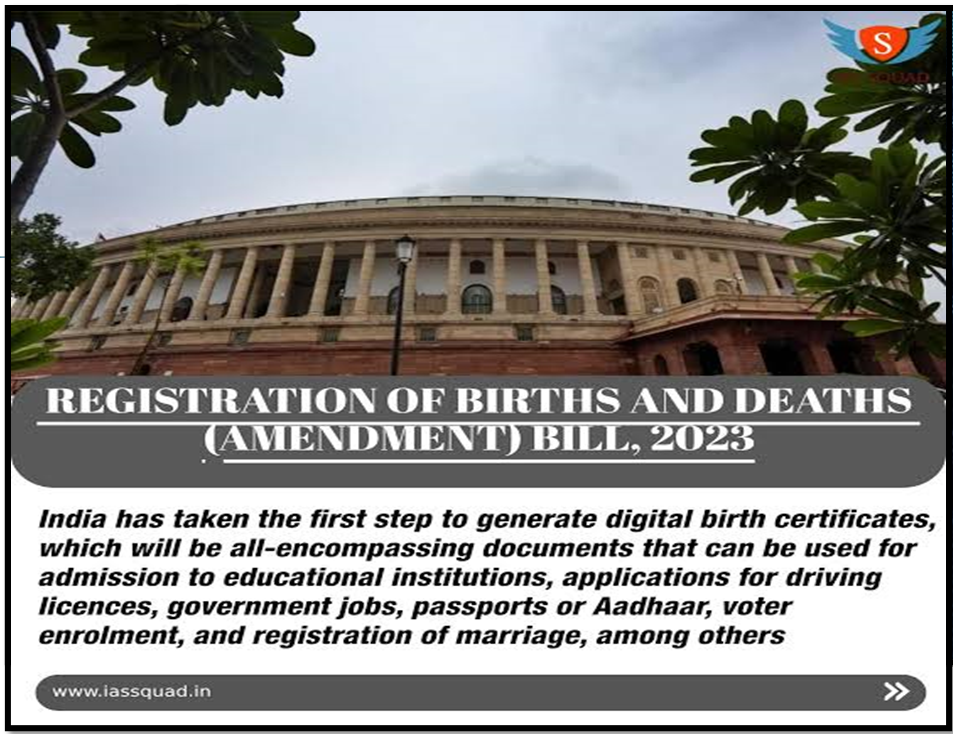ADVOCATING FOR A SECULAR CHILDHOOD
Syllabus:
GS 1 : Secularism
GS 2 : Indian Constitution : Features, Amendments and Significant Provisions.
Why in the News?
- The recent implementation of the Registration of Births and Deaths
- (Amendment) Act, 2023, has ignited a debate on the ethical implications of mandating the registration of a child’s religion at birth.
- This practice not only encroaches upon the child’s freedom but also fosters communalism, patriarchal norms, and majoritarianism within society.
Source: IASsquad
| About Registration of Births and Deaths (Amendment) Act, 2023
The Registration of Births and Deaths (Amendment) Act, 2023 introduces significant changes to India’s registration system, aiming to digitize the process and enhance efficiency. Here are the key features: Key Features: 1. Digital Registration:
2. Single Digital Document:
3. Multi-Purpose Usage:
4. Collection of Aadhaar Numbers:
5. Centralized Database:
|
Childhood and Individual Freedom:
- Mandating the registration of a child’s religion at birth violates their fundamental human rights and inhibits their ability to develop an independent moral framework.
- Children, in their formative years, are susceptible to societal pressures and parental influence, which often shape their religious beliefs without their consent.
- Research indicates that a significant portion of a child’s brain development occurs within the first 1,000 days of life, during which they absorb the norms and values prevalent in their environment.
- Religious indoctrination during childhood can lead to lifelong adherence to predetermined beliefs, hindering the child’s capacity for critical thinking and individual growth.
- The law should not impose barriers that restrict a child’s potential to forge their unique path and explore diverse perspectives beyond inherited traditions.
Historical Precedents:
- Throughout history, established religions have exhibited hostility towards individuals who challenge orthodox beliefs or pursue scientific inquiry.
- The persecution of figures like Galileo Galilei by the Roman Catholic Church underscores the dangers of stifling intellectual freedom and dissent.
- Galileo’s astronomical discoveries, though initially condemned as heresy, laid the foundation for modern physics and scientific progress.
- Imposing religious identities on children at birth risks perpetuating a culture of dogmatism and intolerance, inhibiting intellectual curiosity and innovation.
- Societies must safeguard the right of individuals, including children, to question and explore diverse belief systems without fear of reprisal or persecution.
Influence on Future Generations:
- Children serve as the architects of future societies, with their upbringing profoundly influencing the values and norms of successive generations.
- The environment in which children are raised can either nurture inclusivity and empathy or perpetuate divisive ideologies such as communalism and casteism.
- Parents, guided by inherited beliefs, may unwittingly perpetuate discriminatory practices that stifle the true potential of their children.
- Lawmakers bear a responsibility to enact policies that prioritize the secular upbringing of children, free from the imposition of religious identities.
- Failure to safeguard the secular childhood experience risks entrenching majoritarianism and exacerbating social and economic inequalities in society.
Championing Secular Childhood:
- Advocates must mobilize to challenge laws that infringe upon the rights of children to form their religious beliefs autonomously.
- Educational institutions play a vital role in promoting critical thinking skills and fostering an inclusive environment that respects diverse religious and cultural backgrounds.
- Civil society organizations can collaborate to raise awareness about the importance of secular childhood and advocate for policy reforms that prioritize individual freedom and autonomy.
- Religious leaders have a moral obligation to promote tolerance and respect for differing beliefs, ensuring that children are not subjected to coercive religious indoctrination.
- Policymakers must recognize the inherent value of a secular upbringing in nurturing compassionate, open-minded individuals capable of contributing positively to society.
Challenges:
Legal and Policy Hurdles: Implementing reforms to safeguard secular upbringing faces opposition from conservative lawmakers and religious institutions resistant to change.
Social Resistance: Prevailing societal norms may hinder efforts to promote secular childhood experiences, as many believe religious identity should be imposed from birth.
Parental Influence: Parents, influenced by their own beliefs, may resist initiatives promoting secular upbringing due to fear of cultural loss or societal rejection.
Religious Institutions: Religious entities may oppose efforts prioritizing secularism, perceiving them as threats to their authority and influence.
Lack of Awareness: Many may be unaware of the importance of secular childhood experiences or the harm caused by religious indoctrination, hindering reform efforts.
Political Polarization: Discussions on religion and secularism may become contentious in politically polarized environments, challenging bipartisan support for legislative reforms.
Way forward:
Educational Campaigns:
Launching programs to raise awareness about secular childhoods and the risks of religious indoctrination, aiming to reshape societal views and gather support for reforms.
Policy Amendments: Advocating for changes in laws mandating the registration of a child’s religion at birth, ensuring children have the freedom to explore beliefs independently.
Parental Empowerment:
Providing parents with resources to raise children in a secular manner, encouraging critical thinking and open discussions about diverse beliefs.
Interfaith Engagement:
Facilitating dialogue between religious leaders and secular organizations to promote tolerance and understanding of diverse beliefs.
Community Participation:
Involving local communities and civil society groups to advocate for secular childhood initiatives at the grassroots level.
Legal Advocacy: Collaborating with legal experts to uphold children’s rights to religious freedom, challenging discriminatory laws and policies.
Conclusion
divisions, and impedes social progress. It is incumbent upon society to champion the cause of secular childhood, safeguarding the rights of children to explore diverse beliefs and forge their unique paths free from coercion and prejudice.
Source:
Mains Practice Question:
Discuss the significance of the Registration of Births and Deaths (Amendment) Act, 2023, in India’s administrative and governance framework. Explain the key features of the amendment and analyze its potential impact on digitizing the registration process.




